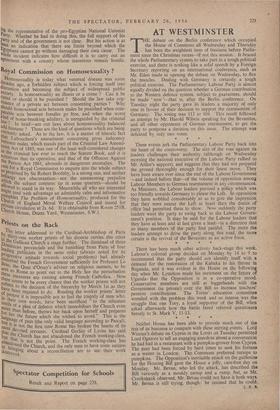AT WESTMINSTER
THE debate on the Berlin conference which occupied the House of Commons all Wednesday and Thursday has been the weightiest item of business before Parlia- ment since the Christmas recess—if not this session. It braced the whole Parliamentary system to take part in a tough political exercise, and there is nothing like a solid speech by a Foreign Secretary reporting on an international conference, such as Mr. Eden made in opening the debate on Wednesday, to flex the muscles. Dealing with Germany is certainly a tough political exercise. The Parliamentary Labour Party is almost equally divided on the question whether a German contribution to the Western defence system, subject to guarantees, should be made ' now '—that is, after the Berlin conference. On Tuesday night the party gave its leaders a majority of only nine in favour of their decision to support the rearmament of Germany. The voting was 113 to 104. This result followed an attempt by Mr. Harold Wilson speaking for the Bevanites, and all other opponents of German rearmament, to get the party to postpone a decision on this issue. The attempt was defeated by only two votes. * * * * These events jerk the Parliamentary Labour Party back into the heart of the controversy. The size of the vote against its leaders challenges their authority (although on Wednesday morning the national executive of the Labour Party rallied to Mr. Attlee's support), and suggests that they had not prepared the ground thoroughly enough for their latest move. They have been aware ever since the end of the Labour Government —and indeed before that—of the volume of opposition among Labour Members to German rearmament in any circumstances. As Ministers, the Labour leaders pursued a policy which was too friendly towards Germany to please the Left. In opposition they have wobbled considerably se) as to give the impression that they were nearer the Left at heart than the duties of office had permitted them to show. Now suddenly the party leaders want the party to swing back to the Labour Govern- ment's position. It may be said for the Labour leaders that they have at least and at last given a lead—in a direction that so many members of the party find painful. The more the leaders attempt to drive the party along this road, the more certain is the revival of the Bevanites as an active force. * * * * There has• been much other activity back-stage this week. Labour's colonial group decided on Monday by 14 to 9 to recommend that the party should not identify itself with a demand for the restoration of the Kabaka to his throne in Buganda, and it was evident in the House on the following day when Mr. Lyttelton made his statement on the future of Uganda. that the Opposition is in a co-operative mood. Conservative members are still at loggerheads with the Government (in private) over the Bill to increase teachers' pension contributions. The Tories' education committee wrestled with the problem this week and so intense was the struggle that one Tory, a loyal supporter of the Bill, when asked afterwards how the battle fared referred questioners fiercely to St. Mark V, 11-13. * * * * Neither House has been able to provide much out of the rest of its business to compare with these stirring events. Lord Winster's debate on Cyprus in the Lords on Tuesday permitted Lord Ogmore to tell an engaging anecdote about a conversation he had had in a restaurant with a pumpkin-grower from Cyprus. The man had been forced by hard times to seek his fortune as a waiter in London. The Commons preferred turnips to pumpkins. The Opposition's inevitable attack on the guillotine for the Housing Bill gave the House a jolly, care-free day on Monday. Mr. Bevan, who led the attack, has described the Bill variously as a mouldy turnip and a ramp, but, as Mr. Crookshank observed, Mr. Bevan could not have it both ways. Mr. Bevan Is still trying, though: he insisted that he could.


































 Previous page
Previous page